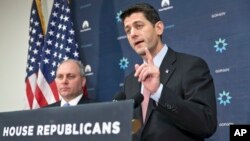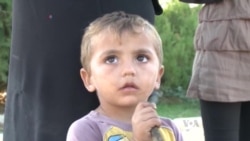President Barack Obama said Wednesday that comments about Syrian refugees made by some U.S. politicians were "offensive" and "hysterical."
Speaking on the sidelines of the Asia-Pacific Economic Cooperation summit in the Phillippines, Obama doubled down on his criticism of lawmakers, governors and presidential candidates who have said his plan to admit thousands of Syrian refugees to the United States this year carries too much of a security risk.
"We are not well-served when, in response to a terrorist attack, we descend into fear and panic. We don't make good decisions if it's based on hysteria or an exaggeration of risks," Obama said, adding that the rhetoric that had been coming out in the debate on refugees was a "potent recruitment tool" for Islamic State terrorists.
Concerns have been raised about the U.S. plan to admit 10,000 Syrian refugees following the discovery that one of the terrorists involved in Friday’s bloodshed in Paris had slipped into Europe with a wave of Syrian migrants.
"When individuals say we should have a religious test and that only Christians, proven Christians, should be admitted, that's offensive," Obama said. "It needs to stop because the world is watching."
Earlier, White House officials spoke with 34 state governors via a conference call to explain how refugees are screened for entry to the U.S.
More than 20 state governors have said that refugees are not welcome in their states.
Briefing for House
Late Tuesday, U.S. Homeland Security Secretary Jeh Johnson and FBI Director James Comey briefed all members of the U.S. House of Representatives on national security measures in the aftermath of the Paris attacks.
Republican Representative Richard Hudson of North Carolina said he was sponsoring legislation that would halt the Obama administration’s Syrian resettlement program until the FBI could certify that all refugees from that country had been adequately vetted. The bill could come up for a vote as early as Thursday.
Hudson said Comey told lawmakers it is difficult to vet Syrian refugees because there is no third party in Syria to consult.
Earlier Tuesday, House Speaker Paul Ryan called for a pause in the U.S. acceptance of Syrian refugees, saying, “This is a moment where it is better to be safe than sorry.”
Among the governors expressing reluctance to accept Syrian refugees in their states was Alabama's Robert Bentley.
"When you know that some of the people coming from that region have the potential to be terrorists, we can’t take a chance of that,” he said.
Presidential candidates, including Republican Ted Cruz, have also weighed in on the issue. Cruz called the Obama administration’s plan to bring in thousands of Syrian Muslims “absolute lunacy.”
Related video by VOA's Michael Bowman:
Measures defended
A senior administration said many of the critics' concerns appeared to be based on either their unfamiliarity with the U.S. resettlement program or misinformation.
“I find that I am correcting a lot of false information that has been passed to them from people who are unfamiliar with the program,” the official said.
Officials say the U.S. refugee admissions process takes 18 to 24 months and includes multiagency screenings, background checks and criminal records checks. The bulk of the screenings take place outside the United States, before there is a decision on whether the refugee can travel into the country.
A senior administration official said the enhanced screening for Syrian refugees included a review of “certain cases” with national security indicators to check for fraud. As an example, the official said, U.S. intelligence officials would check to see whether the refugee’s story about military aggression in Syria matched up with conditions reported in Syria during that time period.
An administration official said that thus far, about half the Syrians brought to the United States have been children.
The official said a quarter were adults over age 60, and only about 2 percent were “single males of combat age.”
The administration remains “steadfastly committed” to Obama’s resettlement plan, said State Department spokesman Mark Toner.
“We think we can do this safely and in a way that represents the best of American values,” he added.
Refugees defended
On Tuesday, a group of U.S.-based humanitarian and resettlement leaders also responded to the growing criticism of Syrians resettling in the United States.
Kevin Appleby, director of migration policy at the U.S. Conference of Catholic Bishops, said the United States had resettled Syrians during the past few years without “any incidents.”
Lutheran Immigration and Refugee Services President Linda Hartke questioned the legality of any gubernatorial moves to block refugees from certain states.
“Some of the actions that maybe considered by governors, of not providing social services,” said Hartke, could “end up being challenged in court.”
The potential state efforts have also drawn criticism from Human Rights Watch.
“The governors’ announcements amount to fear-mongering attempts to block Syrians from joining the generous religious groups and communities who step forward to welcome them,” said the group’s Alison Parker.






